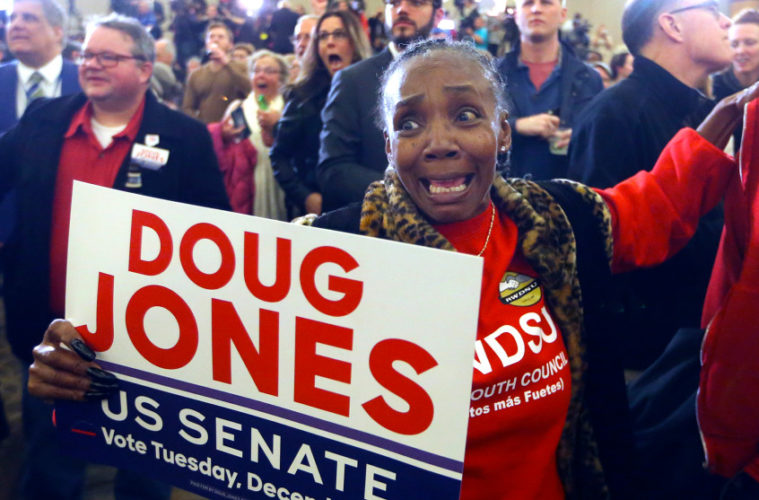Tuesday
A New Yorker article on “How the Alabama Senate Election Sanctified Black Women Voters” reminded me of a Lucille Clifton poem where the poet makes a similar point. Black women don’t want to be turned into saints.
As the most loyal Democratic voting bloc, with percentages regularly hitting the 90+ percentile, black women have been seen as saving America from itself. Doreen St. Felix writes,
The hosannas accumulated on social media and in the news, a multiplicity of brief ecstasies for the citizen who has been, as bell hooks wrote in “Ain’t I a Woman,” “socialized out of existence”: “It’s really nice of black people to save America—after slavery, Jim Crow, and everything else.” “What if we just let black women run everything” and, in response, “I’m definitely ready for that. I said a prayer the other day and when God answered me back she was a Black Woman.” “Black voters, in particular black women, save America again.” “Dear America, We will always save your ass, because at the end of the day, we live here and love this country, even if you don’t always love us back.” The proven adage is that black women are the backbone of the Democratic Party. That black women themselves trade in such phrases only stresses the obstinacy of the idea that “black women will save America from itself.”
So what’s wrong with this picture? Well, when black women are regarded as saviors, their particular needs aren’t acknowledged. They are seen as selflessly working for the good of the nation as a whole, idealized nanny figures, rather than as people with agendas of their own–agendas that might not be identical with those of the white liberal class. St. Felix points out,
Critical nuances—aspects of class and region, especially—are lost when black women become icons, forever trapped in a cycle of ennoblement, flattening, and dehumanization.
Clifton makes her version of the complaint in “note to self,” which I’ve previously written about here. The poem complains about being suffocated by whites who insist on blacks using only “language that they can live with”:
as if when i choose words
i must choose those
that they can live with
even if something inside me
cannot live…
At the end, the poem takes an unexpected turn. The problem doesn’t change, Clifton notes, when blacks are put on a pedestal rather than demonized. She complains of how
the merely human
is denied me still
and i am now no longer beast
but saint
I have mentioned how Clifton had me specifically in mind, referencing my participation in a race panel discussion when she writes,
even the best believe
they have that right,
believe that
what they say i mean
is what i mean
And indeed I had been guilty, coaching a black student to express herself differently rather than focusing on the white community’s responsibility to recognize the source of her hurt.
I also was guilty, when we had another racist incident a few years later, of thinking that Clifton could step in and make everything okay. I didn’t realize that she too was floundering around trying to figure out an appropriate response. I treated her as a saint, not as merely human.
As Clifton writes in a poem about the death of Martin Luther King, we can’t depend on individuals to save us. We can’t turn to black saviors any more than we can turn to white saviors. Rather, we must recognize that we are all “merely human” and work together to handle our challenges.
St. Felix points out that there was nothing magical about black women in the Alabama election. They did what any group must do if it hopes to prevail:
A canvasser for Jones, Carissa Crayton, told HuffPost, “We did put in a lot of hard work. We hit the ground running and we did the work that it took to get Doug elected. People shouldn’t disregard that and just think . . . we saved the day without doing any hard work, that we just magically went out and voted and that that’s all we did.” The grassroots organizing done by black women in Alabama in the run-up to Jones’s election shows the work of a political class.
To which St. Felix adds,
Their interests deserve to be known and reported on.
This is what Clifton requests as well. The added bonus is that it makes for more effective politics.


